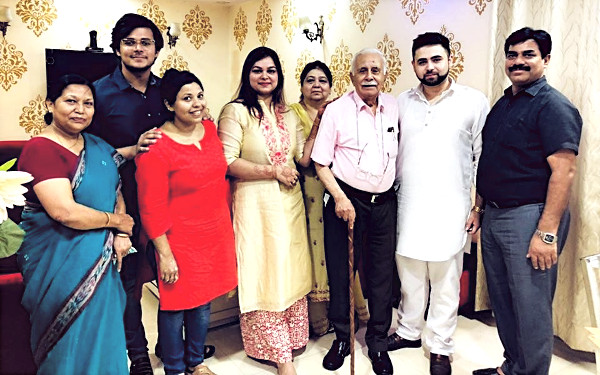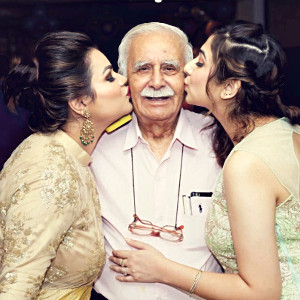Latest Contributions
Reminiscences at Random

Niti Paul Mehta was born in 1932 in Bahawal Nagar (now in Pakistan) in pre-Independence India. As his father was in the Indian Railways, he had to change schools each time his father had a transfer. Thus, he was educated in various cities of Punjab and finally graduated from Government College, Rohtak in 1953. He did his Bachelors in Teaching from Vaish College, Rohtak and his Masters in English from Aligarh Muslim University. He retired as Vice Principal of a senior secondary school in Delhi in 1993 and continues to live in Delhi.
Editor's Note: Shri Mehta's articles, middles and short stories have appeared in almost all the major national dailies and magazines. Some of his articles have been included in anthologies as well. Many prominent writers have quoted his work in their books / articles. At InOurDays.org, we are very privileged to publish four pieces by Shri Mehta here.
Private diary. The dead Phone. And thy Kingdom!
Of all the diaries you maintain that of your memory is the best — the most private, intimate, detailed and honest. It is the best recorded diary.
I am 86, so I have a thick diary tucked away in my mind. Whenever I sit alone in a pensive mood my mind turns some page of this diary. Today I was in such a mood and a page tuned.
The incident happened some 40/45 years ago. That morning when I got up, the first thing I noticed was that my phone was dead. Those days it happened very often.
After breakfast I walked down to an office some 200 yards from my home to register the complaint about my dead phone. The owner of that office was a young man. He knew me well.
He stood up when he saw me enter his office. I told him that I wanted to use his phone. He always kept his phone locked. So he unlocked the phone, kept the lock and the key on the table and went out, thinking that perhaps I had something private to talk on the phone.
After making my complaint I locked the phone and came out to hand the key to the boy.
I found him sitting on the bonnet of a car parked close to the wall of a three storied building. As I bent forward to hand him the key, a brick landed at the base of my neck. It hit me with a great force as if someone had landed a heavy blow with a 5 kg hammer on the neck.
In fact, the brick had come all the way from the roof of a three-storied building. While traveling down it had gathered great force because of the increased velocity.
As it hit my neck, it bounced and landed on my hip and from there it slithered down my right leg, peeling off a lot of skin from the back of my heel.
The boy immediately looked up and shouted an obscenity at the man sitting on the roof of the building. The brick had slipped from the hand of this man while he was fixing the antenna of his TV set. If I had not bent forward to hand the key to the boy, the brick would have landed straight on my head. That day the distance between me and my death was just of half an inch.
But God was close by.
And I live on to tell this tale after 40 years.
Newspaper Boy, Wife and that Cup of Joy
The newspaper boy was at the gate. He threw in the rolled newspaper. Like an accurately aimed missile as it landed close to the door.
He turned and walked to the door, picked up the paper and was about to remove the rubber band to unfold it but suddenly stopped short.
Reading the newspaper without a cup of tea?
Not just because the two always go together but also because he had come to believe for some time now that it wasn't safe to read the newspaper on an empty stomach.
But his wife was still asleep. Maybe ten years of overwork, the grinding double load of two jobs: one she had at the office and the other of being a housewife, had taken their toll.
Perhaps her sleep for longer hours that morning was a protest. The strain had become too much for her. But even then she hadn't ever said “no". It seemed that at long last her body had taken over from her and screamed “NO" in capital letters.
He understood.
With a wry smile he turned and went into the kitchen. When he woke her up and handed her the cup of tea, the expression on her face spoke of her sense of gratitude as it had never done in all those ten years.That was a moment of revelation for him and it marked the beginning of a new kind of kinship between them. It added new dimensions and depth to their relationship.
Life became a shared journey!
Prabhuji Saath Thhe
Uncle Parmanand, my father's elder brother, was a sagely person. Right from his younger days he was spiritually inclined. People often said that they experienced a deep sense of solace and peace in his presence.
Once he came home very late in the night. He had gone to listen to the discourse of a sadhu at his dera (camp) on the outskirts of the village.
People of the village rarely ventured outside the village at night. Our village was surrounded by deep ravines which were infested with wild animals. People had been attacked by wolves.
My grandmother was naturally very worried.
In the morning she decided to talk to him.
"Parma," she said, "were you not afraid while walking through those ravines at night?"
"Afraid of what?" asked uncle Parmanand.
"You know danger lurks at every step in those ravines and you were all alone."
"I saw no danger," replied my uncle, "and I was not alone."
"Who was with you?"asked my Grandmother.
"Prabhuji saath thhe (God was with me.)," he said.
"Did you see Him?", asked my Granny.
"No," he said, "but I could feel His presence. Last night we were walking together."
My grandmother stared at him but said nothing. She was always puzzled by the things he said.
He was forty something when he fell ill. He had fever for about a week. One evening a lady who lived next door came to enquire about his health. She and my grandmother sat talking beside my uncle's bed.
Suddenly he got up, rolled his bed, placed it on the head side of the cot and sat down with his back resting against the rolled bed.
"What is this, Parma?" asked my Grandmother puzzled by this act.
"It is time to leave, Ma," he replied. "They have brought a palanquin for me. Do you have some money? I have to pay to the palanquin bearers."
My grandmother untied the knot at the corner of her dupatta, took out 12 annas and gave these to him.
He took the money and placed it on the cot. "They are not accepting it now. You took so long to untie these coins."
Tears rolled down my grandmother's cheeks. "You are talking strange things, Parma."
"I have to leave. They have got everything ready now," he said.
"When your brother comes and asks about you, what will I tell him?" she asked.
"Tell him that I have gone for a walk through some very beautiful gardens."
"Which gardens?"
"Those gardens are not here", he said. "They are there, far away from here."
With these words uncle Parmanand stretched himself on the cot and was gone.
Diwali - the Festival of Lights
Diwali is a festival of lights. Light is a multiple symbol of positivity. Darkness, on the other hand, is associated with all the dark forces of evil, ignorance, superstition, things secret and sinister. It nurtures fear, uncertainty, suspicion, distrust and a diversity of apprehensions. It is the domain of Satan. Satan is known as the prince of darkness.
Light is the antithesis of darkness. It dispels darkness and doubt and brings clarity, unravels mystery, reveals truth by removing ambiguities and vague apprehensions created by the enveloping darkness as it symbolizes knowledge which equips us to see everything clearly in its proper perspective.
Light is a symbol of clarity and transparency. It stands for mental and spiritual enlightenment. Above all light sustains life as it symbolizes perpetual hope. It is the silver lining that every cloud has. It is the light at the end of the tunnel.
It is the perpetual guiding light. It is the Diwali light, the light of joy to welcome Lord Rama as he returns home after defeating and destroying the greatest enemy of man, the evil force of darkness so that light Divine could prevail.
So I urge you all to celebrate this festival with gusto. Year on Year.
Let us celebrate Diwali in its true spirit!

Shri Niti Paul Mehta with his family.

Shri Niti Paul Mehta with his granddaughter, Shweta Mehta (right), and granddaughter-in-law, Juhi Varun Mehta (left).
Comments
Beautifully penned!
Beautifully penned!
The beauty and vibrance of your narration, Sir, leave the readers awestruck. Each anecdote presented before us are so vivid that the events flash right before our eyes in sequence; as though we were present in that every story. Such writings nowadays are rare to find. Kindest regards,
Sangeeta Gogoi.
Anecdotes
Human interest at its best.
Add new comment